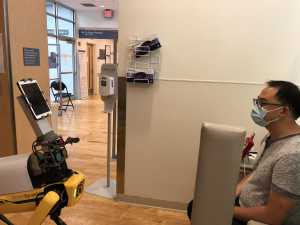Author Interviews, Genetic Research, Ophthalmology, Science / 12.03.2021
Many More Genes Discovered to Play a Role in Eye Color
MedicalResearch.com Interview with:
 Dr Pirro Hysi
Senior Lecturer in Ophthalmology
Kings College London
MedicalResearch.com: What is the background for this study?
Response: - Iris (eye) color is an important human trait. It is one of the main features that makes our faces unique and recognizable. Iris color is similar to other pigmentatio traits, like hair and skin color, in that it is determined by the concentration and relative ratios of the melanin pigment. Pigmentation traits are roughly determined by several of the same genes regulating pigmentation, but many other genes seem to selectively determine pigmentation in any of these tissues.
(more…)
Dr Pirro Hysi
Senior Lecturer in Ophthalmology
Kings College London
MedicalResearch.com: What is the background for this study?
Response: - Iris (eye) color is an important human trait. It is one of the main features that makes our faces unique and recognizable. Iris color is similar to other pigmentatio traits, like hair and skin color, in that it is determined by the concentration and relative ratios of the melanin pigment. Pigmentation traits are roughly determined by several of the same genes regulating pigmentation, but many other genes seem to selectively determine pigmentation in any of these tissues.
(more…)
 Dr Pirro Hysi
Senior Lecturer in Ophthalmology
Kings College London
MedicalResearch.com: What is the background for this study?
Response: - Iris (eye) color is an important human trait. It is one of the main features that makes our faces unique and recognizable. Iris color is similar to other pigmentatio traits, like hair and skin color, in that it is determined by the concentration and relative ratios of the melanin pigment. Pigmentation traits are roughly determined by several of the same genes regulating pigmentation, but many other genes seem to selectively determine pigmentation in any of these tissues.
(more…)
Dr Pirro Hysi
Senior Lecturer in Ophthalmology
Kings College London
MedicalResearch.com: What is the background for this study?
Response: - Iris (eye) color is an important human trait. It is one of the main features that makes our faces unique and recognizable. Iris color is similar to other pigmentatio traits, like hair and skin color, in that it is determined by the concentration and relative ratios of the melanin pigment. Pigmentation traits are roughly determined by several of the same genes regulating pigmentation, but many other genes seem to selectively determine pigmentation in any of these tissues.
(more…)




 Anne Yuk-Lam Ho, MPH
Million Veteran Program (MVP) Data Core
MVP Coordinating Center
VA Boston Healthcare System
MedicalResearch.com: What is the background for this study?
Response: Cardiovascular disease (CVD) has been the leading cause of morbidity and mortality globally. Prevalence of CVD among US population is approximately 7% which places huge burden on our healthcare systems. And prevalence of CVD is as high as 28% among veterans at the VA healthcare system as veteran users are primarily older male with more histories of comorbidities. Most CVD risk factors including lipids and blood pressure can be controlled by lifestyle modifications, such as diet.
Chocolate is among dietary factors that play a role in modulating CVD risk factors is widely consumed in the US (~2.8 billion pounds annually. Although previous studies have reported beneficial effects of chocolate and/or cacao products (rich in flavonoids) on lipids, glucose metabolism and risk of diabetes, and lipids, little is known about the association of chocolate intake with coronary artery disease (CAD) among US veterans. Thus, sought to test the hypothesis that chocolate consumption is associated with a lower risk of CAD among xxx US veterans enrolled in the Million Veteran Program.
Anne Yuk-Lam Ho, MPH
Million Veteran Program (MVP) Data Core
MVP Coordinating Center
VA Boston Healthcare System
MedicalResearch.com: What is the background for this study?
Response: Cardiovascular disease (CVD) has been the leading cause of morbidity and mortality globally. Prevalence of CVD among US population is approximately 7% which places huge burden on our healthcare systems. And prevalence of CVD is as high as 28% among veterans at the VA healthcare system as veteran users are primarily older male with more histories of comorbidities. Most CVD risk factors including lipids and blood pressure can be controlled by lifestyle modifications, such as diet.
Chocolate is among dietary factors that play a role in modulating CVD risk factors is widely consumed in the US (~2.8 billion pounds annually. Although previous studies have reported beneficial effects of chocolate and/or cacao products (rich in flavonoids) on lipids, glucose metabolism and risk of diabetes, and lipids, little is known about the association of chocolate intake with coronary artery disease (CAD) among US veterans. Thus, sought to test the hypothesis that chocolate consumption is associated with a lower risk of CAD among xxx US veterans enrolled in the Million Veteran Program.












 MedicalResearch.com: What is the background for this study? What are some of the functions that Dr. Spot can facilitate?
Response: During the COVID-19 pandemic, we wanted to consider innovative methods to provide additional social distance for physicians evaluating low acuity individuals who may have COVID-19 disease in the emergency department. While other health systems had instituted processes like evaluating patients from outside of emergency department rooms or calling patients to obtain a history, we considered the use of a mobile robotic system in collaboration with Boston Dynamics to provide telemedicine triage on an agile platform that could be navigated around a busy emergency department. Dr. Spot was built with a camera system to help an operator navigate it through an emergency department into a patient room where an on-board tablet would permit face-to-face triage and assessment of individuals.
MedicalResearch.com: What is the background for this study? What are some of the functions that Dr. Spot can facilitate?
Response: During the COVID-19 pandemic, we wanted to consider innovative methods to provide additional social distance for physicians evaluating low acuity individuals who may have COVID-19 disease in the emergency department. While other health systems had instituted processes like evaluating patients from outside of emergency department rooms or calling patients to obtain a history, we considered the use of a mobile robotic system in collaboration with Boston Dynamics to provide telemedicine triage on an agile platform that could be navigated around a busy emergency department. Dr. Spot was built with a camera system to help an operator navigate it through an emergency department into a patient room where an on-board tablet would permit face-to-face triage and assessment of individuals.


 Laura M. Bogart, PhD
Senior Behavioral Scientist
RAND Corporation
Santa Monica, CA 90407-2138
MedicalResearch.com: What is the background for this study?
Response: Recent media polls continue to show that Black Americans are less likely to intend to get the COVID-19 vaccine than White Americans, and initial state data show a similar racial/ethnic disparity in vaccination rates. Initial uptake of the vaccine has been significantly affected by inequities in vaccine access and supply. In addition to these challenges, other factors contribute to hesitancy around vaccination, including self-perceived risk of infection, trust in the vaccine itself, trust in healthcare systems, healthcare providers, and policymakers who support the vaccine, and trust in the pharmaceutical industry and clinical research. In this study, we conducted a survey of a nationally representative sample of 207 Black Americans in late 2020, after initial COVID-19 vaccine effectiveness and safety data were released to the public. We also did in-depth interviews with a subsample of those surveyed who said that they would not get vaccinated. In addition, we engaged with a stakeholder advisory committee comprised of individuals who represent different subgroups and organizations in Black communities in the U.S., in order to discuss the results and make recommendations for policies to increase COVID-19 vaccination among Black Americans.
Laura M. Bogart, PhD
Senior Behavioral Scientist
RAND Corporation
Santa Monica, CA 90407-2138
MedicalResearch.com: What is the background for this study?
Response: Recent media polls continue to show that Black Americans are less likely to intend to get the COVID-19 vaccine than White Americans, and initial state data show a similar racial/ethnic disparity in vaccination rates. Initial uptake of the vaccine has been significantly affected by inequities in vaccine access and supply. In addition to these challenges, other factors contribute to hesitancy around vaccination, including self-perceived risk of infection, trust in the vaccine itself, trust in healthcare systems, healthcare providers, and policymakers who support the vaccine, and trust in the pharmaceutical industry and clinical research. In this study, we conducted a survey of a nationally representative sample of 207 Black Americans in late 2020, after initial COVID-19 vaccine effectiveness and safety data were released to the public. We also did in-depth interviews with a subsample of those surveyed who said that they would not get vaccinated. In addition, we engaged with a stakeholder advisory committee comprised of individuals who represent different subgroups and organizations in Black communities in the U.S., in order to discuss the results and make recommendations for policies to increase COVID-19 vaccination among Black Americans. 



 Catharina Svanborg M.D., Ph.D.
Professor at Lund University Department of Laboratory Medicine,
Division of Microbiology, Immunology and Glycobiology
Founder/Chairman of the Board at HAMLET Pharma
MedicalResearch.com: What is the background for this study?
Catharina Svanborg M.D., Ph.D.
Professor at Lund University Department of Laboratory Medicine,
Division of Microbiology, Immunology and Glycobiology
Founder/Chairman of the Board at HAMLET Pharma
MedicalResearch.com: What is the background for this study?





 Kathryn Foti, PhD, MPH
Postdoctoral fellow
Department of Epidemiology
Johns Hopkins Bloomberg School of Public Health
MedicalResearch.com: What is the background for this study?
Response: The Kidney Disease: Improving Global Outcomes (KDIGO) 2021 Clinical Practice Guideline for the Management of Blood Pressure (BP) in Chronic Kidney Disease (CKD) provides recommendations for the management of BP in individuals with nondialysis CKD, incorporating new evidence since the publication of its previous guideline in 2012.
The 2021 KDIGO guideline recommends a target systolic BP <120 mmHg based on standardized office BP measurement. This BP goal is largely informed by the findings of the SPRINT trial which found targeting SBP <120 mmHg compared with <140 mmHg reduced the risk of cardiovascular disease by 25% and all-cause mortality by 27%. The benefits were similar for participants with and without CKD.
In our study, we sought to examine the potential implications of the 2021 KDIGO guideline for BP lowering among US adults with CKD compared to the 2012 KDIGO guideline (target BP ≤130/80 mmHg in adults with albuminuria or ≤140/90 mmHg or under without albuminuria) and the 2017 American College of Cardiology/American Heart Association (target BP <130/80 mmHg) guideline. Additionally, we determined implications of the 2021 KDIGO guideline for angiotensin converting enzyme inhibitor (ACEi) or angiotensin II-receptor blocker (ARB) use for those with albuminuria (recommended at systolic BP ≥120 mmHg) compared to the 2012 KDIGO guideline (recommended at BP >130/80 mmHg).
Kathryn Foti, PhD, MPH
Postdoctoral fellow
Department of Epidemiology
Johns Hopkins Bloomberg School of Public Health
MedicalResearch.com: What is the background for this study?
Response: The Kidney Disease: Improving Global Outcomes (KDIGO) 2021 Clinical Practice Guideline for the Management of Blood Pressure (BP) in Chronic Kidney Disease (CKD) provides recommendations for the management of BP in individuals with nondialysis CKD, incorporating new evidence since the publication of its previous guideline in 2012.
The 2021 KDIGO guideline recommends a target systolic BP <120 mmHg based on standardized office BP measurement. This BP goal is largely informed by the findings of the SPRINT trial which found targeting SBP <120 mmHg compared with <140 mmHg reduced the risk of cardiovascular disease by 25% and all-cause mortality by 27%. The benefits were similar for participants with and without CKD.
In our study, we sought to examine the potential implications of the 2021 KDIGO guideline for BP lowering among US adults with CKD compared to the 2012 KDIGO guideline (target BP ≤130/80 mmHg in adults with albuminuria or ≤140/90 mmHg or under without albuminuria) and the 2017 American College of Cardiology/American Heart Association (target BP <130/80 mmHg) guideline. Additionally, we determined implications of the 2021 KDIGO guideline for angiotensin converting enzyme inhibitor (ACEi) or angiotensin II-receptor blocker (ARB) use for those with albuminuria (recommended at systolic BP ≥120 mmHg) compared to the 2012 KDIGO guideline (recommended at BP >130/80 mmHg). 
